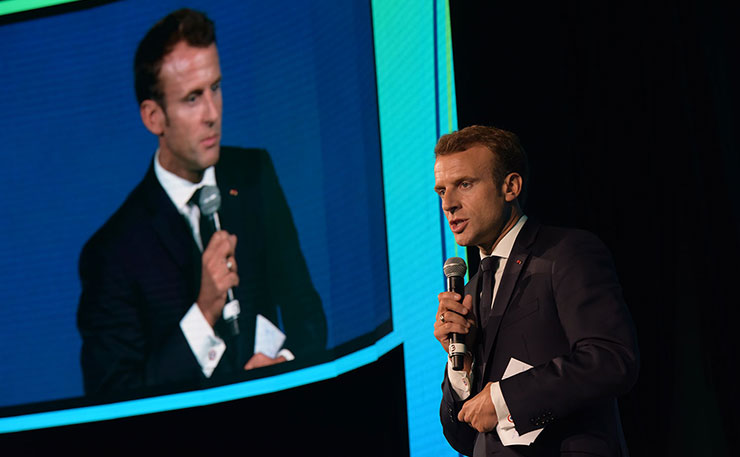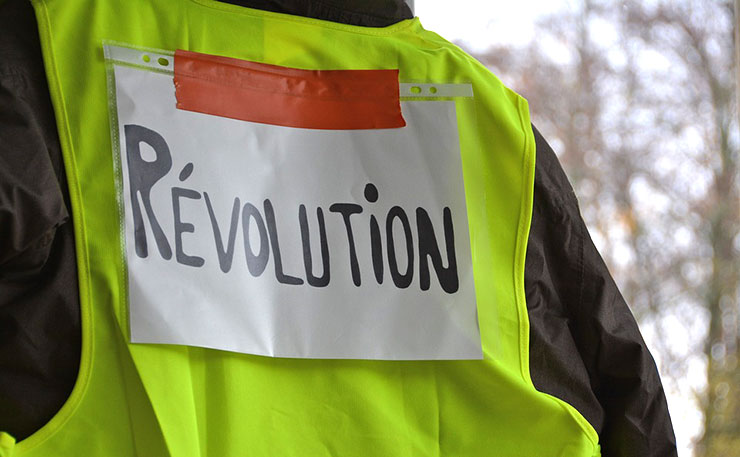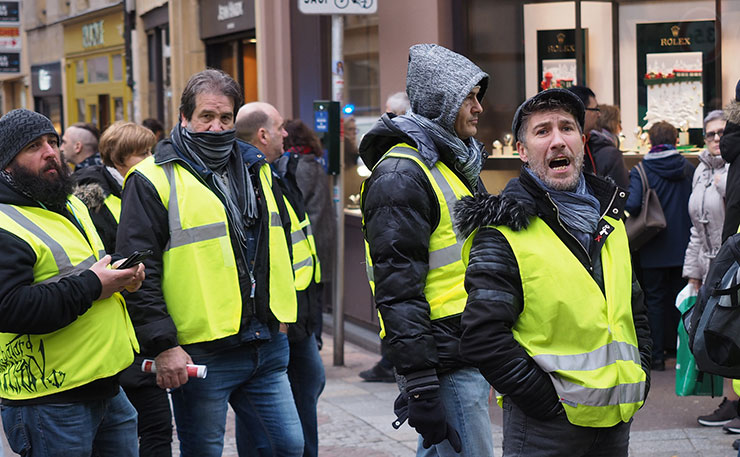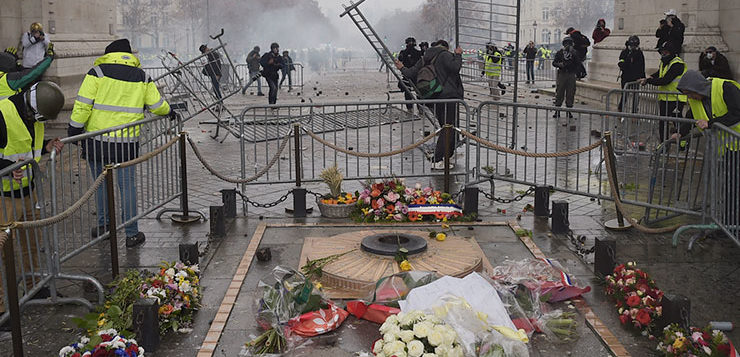As the globe – and the political climate aimed at saving it – heats up, we need a different politics to tackle an entrenched problem, writes Jeff Sparrow.
Sensible centrism will doom us all.
Take Emmanuel Macron, once hailed everywhere as the savior of liberalism.
“Macron,” explained Politico in April this year, “has stepped audaciously into the vacuum created by Trump’s abdication of America’s historic role as keeper of the liberal democratic flame.”
Nor was this an anomalous view in the English-speaking world.
MSNBC host Joy-Ann Reid expressed the perspective of many American Democrats, when she quipped that Macron should be running Washington.
As Salon put it, “Macron appeared to have everything that centrist Democrats could ever want in a candidate; he was young, smart and charismatic, yet also mature and pragmatic (as all centrists are, in the neoliberal worldview). Macron also appeared to be different and innovative, like a political version of a Silicon Valley entrepreneur, and claimed to be “neither left nor right,” as if to have a political ideology was to have an outdated worldview, something like using a flip phone in 2018.”
In Britain, he generated the same kind of excitement among the same kind of people, with Labourite opponents of Jeremy Corbyn enthusing over the ‘new Tony Blair’, even as a new Macron-inspired centrist party called Renew came into being.

One doubts that the Boy Wonder will feature much in Renew’s further history (if indeed it has one), given that recent opinion polls, conducted in the wake of the heroic Yellow Vest rebellion revealed him to be the most unpopular leader in recent times. With riots, blockades and protests spreading across the country, the demand for Macron’s resignation provided a central slogan uniting an often fractious movement.
But his failure represents something more than the misfire of an overhyped media personality. It illustrates the peculiar danger posed by the ongoing infatuation of supposed progressives with the so-called ‘radical centre’.
Macron’s international boosters had presented him as the figure to stem the rise of reactionary populism in Europe, someone who would combine market-based prosperity with liberal reforms. When, in December 2017, Trump repudiated the Paris Climate Accords, Macron launched a slick social media campaign around the slogan ‘Make the planet great again’. To that end, he proposed a so-called ‘eco tax’ on fuel, a levy intended, he explained, to discourage car use and to raise funds for climate change mitigation.
Symptomatically, though, he provided no alternative for working class drivers in the outer suburbs, small towns and rural areas without public transport. The meteoric rise of the Yellow Vests reflected the widespread (and accurate) perception that the fuel tax constituted another attack by a government of the rich on some of the poorest people in the country.
In many ways, the tax represented the final straw for a population long sick of austerity. The Macron bubble had, in fact, already burst well before the Yellow Vests took over the streets. In September, Reuters reported his popularity at a then record low, with voters “ranging from conservative pensioners to low-income workers complain[ing]his policies mostly benefit companies and the rich”.

Nevertheless, for those of us watching from afar, it’s worth reflecting on how centrism brought the rhetoric of environmentalism directly into conflict with the aspirations of the people, in a manner that gave ammunition to the worst denialists.
Hasn’t every right-wing demagogue, from Donald Trump to Pauline Hanson, denounced climate change as a chatter class preoccupation imposed to shackle the working man? Thus, rather than defeating the reactionary populists, Macron provided them, via his tax, with an effective talking point, a confirmation of the perspective they’ve long argued.
As he back-pedalled, the president acknowledged what he called the tension between ‘the end of the world’ and the ‘end of the month’. The formulation was repeated by sympathetic commentators who declared that, in the future, environmental measures must be imposed gradually, so as to ease the pain of those living payday to payday. But that argument, too, accepts the underlying frame of the far right, positing workers as innately opposed to an environmentalism that, by definition, rendered them poorer and more miserable.
In reality, it’s climate change, not climate action, that necessarily threatens ordinary people, simply because the environmental crisis can no longer be disentangled from the broader crisis of a decaying capitalism. The catastrophic weather associated with global warming will, for instance, overwhelmingly affect those already targeted by austerity – the individuals too poor to relocate or rebuild or use aircon or take other preventative measures. The refugees from rising seas will be indistinguishable from the victims of war and poverty; the political ruptures provoked by drought, land degradation and other environmental disasters will blend into the general instability of the 21st century.

The tension between climate activism and the working class emerges not from the nature of the problem but from the logic of centrist solutions, which always centre on neoliberal mechanisms such as carbon taxes. But there’s no environmental reason to rely on the market to combat fossil fuels. A government could, after all, forcibly acquire polluting industries at the stroke of the pen, much as almost every regime nationalised parts of the economy during the Second World War.
YOU MIGHT ALSO LIKE
Strike One: It’s Time To Heat Things Up A Little On Climate Change Action
To put it another way, the decarbonisation of the developed nations could be presented in a program designed to extend democratic control over industry, improve working conditions and materially improve the lives of the populace. If it’s not – if climate action instead becomes a fig-leaf for austerity – that’s because of political choice rather than necessity.
Centrists pride themselves on their political acumen. Carbon taxes and other market mechanisms might not be ideal, they say, but they reflect the horizon of the possible. We must not let the perfect be the enemy of the good, and it’s better to do something than nothing at all.
Macron’s example demonstrates the bankruptcy of that argument. To their credit, the Yellow Vests seem to be moving to the left rather than to the right. Nevertheless, the French situation will inspire right-wing populists everywhere to bring climate denial to the front of their agenda, adding to the difficulty of achieving genuine environmental change across Europe and elsewhere.
The fight for climate change depends on ordinary working people. We have more to learn from the Yellow Vests and their militancy than we do from ‘sensible centrists’, no matter how much they drape themselves in green. Now, more than ever, climate action must become radical.
Donate To New Matilda
New Matilda is a small, independent media outlet. We survive through reader contributions, and never losing a lawsuit. If you got something from this article, giving something back helps us to continue speaking truth to power. Every little bit counts.




